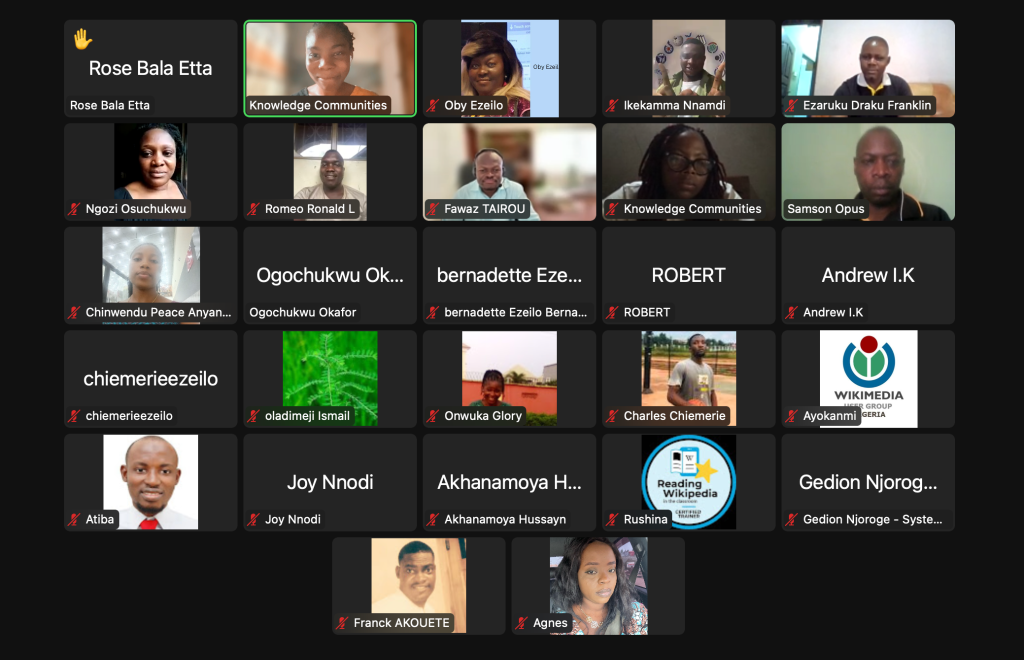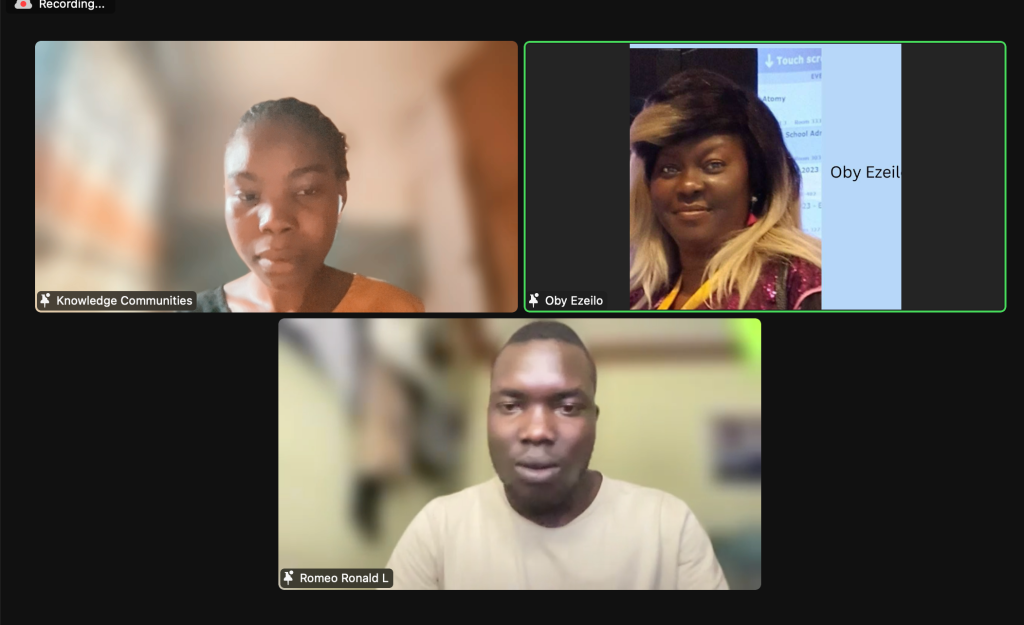Code for Africa hosted the September edition of the Wikimedian-in-residence (WiR) Anglophone community conference on Thursday, 18th September 2023. The conference includes a 1.5-hour panel discussion moderated by Bukola James (CfA’s WiR community coordinator bringing together 34 members of the CfA’s WiRs Anglophone community from Cameroun, Kenya, Nigeria, Rwanda, South Africa, and Togo under the theme “Empowering a Sustainable African Presence on Wikipedia through Capacity Building and Collaborative Approaches”, we heard from Wiki Experts such as Oby Ezeilo (Founder, Wiki for Senior Citizens Network, Nigeria) and Romeo Ronald, (Team leader, Wikimedia community user group, South Sudan). The virtual event was inspired by the outcome of the previous conference held on the 22nd of June Boosting African Presence on Wikipedia. The WiR Anglophone community contributed built upon the outcome of the past conference by identifying and addressing the potential underrepresentation of African narratives on Wikipedia, fostering enriching discussions that will encourage African Wikimedians to actively participate in augmenting and sustaining African content on Wikimedia platforms through capacity building and collaborative approaches.
Sustainable African Presence On Wikipedia Conference Highlights:
The conference started with speakers sharing their thoughts on how the key variables in the theme of the conference play a pivotal role in enhancing the representation of African content on Wikipedia and related projects including the opportunities and potentials these initiatives could unlock for a more robust African representation online. It further dwelled on the importance of diverse voices on these platforms to bring a unique perspective to the discussion. The discussion then shifted to understanding the significance of collaboration and capacity building serving as a universal sentiment of necessity for shared goals and objectives, ensuring a more inclusive and representative Wikipedia platform for African narratives. The collaboration effort could be seen in the recent Wikimania conference in Singapore, highlighting the global reach and collaboration across the globe.
Community Engagement and Efforts for Sustained African Presence:
In the quest for enhancing African representation on Wikipedia, Content creation and community engagement emerge as a chief cornerstone. At the heart of these efforts lies a deep emphasis on inclusivity by Oby Ezeilo, Founder of “Wiki for Senior Citizens Network, Nigeria,” elucidates this ethos, saying, “Community engagement is the very fabric of our mission unique methods of engagement and the invaluable wisdom they bring forth have been topics of admiration and intrigue. Beyond creating content, we strive to instil a sense of belonging, ensuring every member feels part of a grander narrative, where both their contributions and personal well-being are valued.” This sentiment is underscored by Romeo Ronald, Team Leader of the Wikimedia community user group from South Sudan: “Our community’s vitality springs from its members. We invest in engagement because a united, valued, and proactive community is the scaffold on which we build our ambitious goals.” According to the speakers, regular interactions, feedback sessions, and especially well-being checks foster not just a sense of unity and camaraderie, but also an environment where members’ voices are heard and their hard work is acknowledged. To bolster this engagement and drive forward the strategic approach of enhancing African narratives on Wikipedia and its sister’s project, several key measures are to be put in place, which include:
- Identification and Engagement of members within different Wikicommunities: Efforts should be consistently channelled towards identifying and bringing aboard potential Wikipedia contributors which can be through Online call-outs often acting as the beacon, and inviting interested individuals to learn and contribute offline.
- Beyond Just Editing: Participation in Wikimedia programs should not be limited to just editing. Contributors should be able to hone a variety of skills, which should encompass creative writing, research, and content analysis.
- Partnership with Educational Institutions: In recent times, it has been identified that collaboration with educational institutions has amplified engagement and helped to carve out opportunities for young Wikimedians who make up 53+ % of the total editors on Wikipedia to contribute to Wikipedia projects, weaving a more inclusive tapestry of contributors.
- Collaborative Ethos: Eschewing the conventional competitive spirit, the Wikimedia community embraces a culture of collaboration. It’s not about rankings; it’s about collective growth and knowledge sharing. Regular meetings ensure experiences are shared, challenges are addressed, and learnings are disseminated.
Organising Culturally Rich Events
According to our speakers, the various initiatives aiming to preserve African culture and amplify its representation on Wikipedia are vast, diversified, and executed through programs and campaigns on both regional and annual scales.
A notable effort is the WikiLovesAfrica regional campaign, an annual photo competition that focuses on obtaining and promoting visuals related to the diverse cultures, peoples, and heritage of Africa across Wikipedia and its sister projects. Events like these not only celebrate the essence of Africa but also seed rich content that augments the portrayal of the continent on a global scale.
Romeo highlighted the proactive participation of his community in South Sudan in this campaign by “embracing Mobile Photography.” With the dominance of mobile phones and the relatively rare ownership of professional cameras, the relevance of teaching mobile photography becomes paramount. A specialised workshop is frequently conducted, wherein an expert photographer trains community members and stresses the vital elements for capturing poignant images using mobile devices.
Adding to that, Romeo underscored other initiatives:
- Documenting Cultural Narratives: A project that stands out involves the audio documentation of folk stories and cultural tales. Transformed into podcasts, these stories are widely shared, preserving cultural narratives and making them globally accessible.
- Language and Identity Preservation: Given the changing demographics and the scars of war, there’s a push to save the languages and identities of South Sudan’s tribes, accomplished through audio-visual recordings.
- Integration of Modern and Traditional: There exists a beautiful amalgamation of contemporary techniques and age-old stories. For instance, high-definition video recordings of the elderly recounting their past experiences and tales are ongoing projects.
- Educational Outreach: The focus is also on utilising educational platforms for content generation, evidenced by the introduction of an internal Wiki program.
- Preserving Clan Histories: Recognizing the fleeting essence of life and the repercussions of war, steps are being taken to chronicle the histories of different clans. A notable effort was the documentation of a clan’s history from its last living elderly member.
In a subsequent response to queries about similar endeavours taken by the Wiki for Senior Citizens Network, Oby shared, “Beyond the popular events like WikiLovesMonuments and WikiLovesAfrica, we’re brewing several other platforms and events that we believe will further spotlight African heritage on Wikipedia. We’re continually on the lookout and devising opportunities to shine a light on the profound and vast legacy of our continent.”
Challenges and Solutions in African Wikimedian Contributions: An Insider Look
When discussing the challenges and solutions surrounding Wikimedia contributions, it’s pivotal to understand the distinct experiences of diverse contributors. In our conversation, Oby and Romeo shared their insights on the hurdles they’ve encountered and the strategies they’ve employed to overcome them.
Romeo points out that one of the most prominent issues faced by contributors is access to resources. Despite the vast training resources and support available, a significant challenge remains in ensuring contributors are well-versed in accessing these tools. The key, Romeo believes, is to ensure everyone knows how to pinpoint where to get financial and training support on and off wiki.
Oby, drawing from her extensive work with the “Wiki for Senior Citizens Network,” emphasises the IT challenges among senior Citizens. She notes that simple tasks such as navigating through platforms or even clicking on links can prove overwhelming for the older generation. The remedy? Crafting more intuitive interfaces and providing exhaustive training, custom-made for their needs.
However, challenges aren’t limited to senior citizens. Romeo further adds that newcomers, especially those who aren’t tech-savvy are initially overwhelmed. The vast expanse of information, Wikilinks, and unique Wiki terminologies can be daunting. Coupled with this is the navigational challenge, where understanding the Wiki page layout becomes a formidable task for beginners.
Providing a solution, Oby champions the cause of Wiki Literacy. A strategy she ardently promotes, it’s all about acquainting contributors, particularly seniors, with the basics of a Wiki page, ensuring they can navigate effortlessly, and instilling the confidence to contribute actively.
Diving deeper into challenges, Romeo spotlights issues like contextual translations, where specific terms can get lost in translation. He cites the peculiar instance of “Triangle” being visually perceived as a “pizza.” Other challenges include unfamiliarity with concepts in diverse communities and vocabulary limitations, particularly with subjects like climate change.
Oby provides pragmatic solutions. She suggests onboarding tutorials and hands-on guides to make the initial journey smoother for beginners. She also stresses the importance of regular technical training sessions to bridge the gap in technical know-how.
Romeo touches upon the intricate challenge of dialectal variations in languages. A word might resonate differently across dialects, leading to confusion. His solution? Dialect-specific translations that offer clarity.
Lastly, Oby sheds light on internet connection and technical difficulties. Drawing from a recent conversation glitch, she underscores the importance of a stable internet connection and backup communication channels.
In essence, while the Wikimedia platform provides vast opportunities for global contributors, the journey is strewn with challenges. But as Romeo and Oby highlight, with every challenge comes a solution. By embracing these solutions, the vision of a more inclusive and vibrant Wikimedia community is entirely achievable.
To further bolster this environment of inclusivity and understanding, collaborating with respective stakeholders and communities are pivotal. Such collaborations foster a sense of belonging, ensuring that both old and new contributors feel an integral part of the Wikimedia community. An effective approach, as evidenced by the success of various programs, is the initiation of hands-on training workshops. These workshops not only provide practical knowledge but also offer insights into the nuances of the platform, empowering contributors.
Moreover, feedback sessions stand out as essential pillars of this process. They provide a channel to understand the perspectives and challenges faced by contributors, which in turn, allows for the tailoring of strategies and training to better cater to their needs. It’s crucial to ensure that contributors, especially newcomers, don’t feel overwhelmed. By breaking down tasks, offering step-by-step guides, and fostering collaborative projects, the process becomes more approachable and enjoyable.
Recognition, too, holds a special place in this ecosystem. Celebrating the efforts of contributors, no matter the magnitude, acts as a catalyst, motivating them, boosting their confidence, and ensuring sustained participation. In essence, the secret to a thriving Wikimedia community lies in understanding their needs, equipping them with the right resources, nurturing a conducive environment, and constantly acknowledging their efforts.
Conclusion
In conclusion, while the Wikimedia platform offers an extensive avenue for contributors worldwide, there are still unique challenges faced by individuals, especially those from diverse linguistic and cultural backgrounds. Addressing these challenges with tailored solutions is vital to enhance the overall user experience, increase contributions, and ensure accurate and contextual information dissemination on the platform. Collaboration, training, and open dialogue between contributors from various backgrounds are key to overcoming these challenges and enriching the Wikimedia community.
As this session concludes, we hope that everyone leaves with valuable insights and renewed enthusiasm. We deeply appreciate the active participation and engagement of all attendees. Every contribution, every shared experience, and every piece of feedback contributes to the continued growth and evolution of our community. Lastly, our doors are always open for feedback or suggestions for future webinars or topics. We are unyieldingly committed to improving and catering to the dynamic needs of our community. For those who want a recap or missed out, a recorded version of the conference is available on our community programmes page. Stay tuned and join our ever-growing community in shaping the future of the Wikimedia landscape.

Can you help us translate this article?
In order for this article to reach as many people as possible we would like your help. Can you translate this article to get the message out?
Start translation

